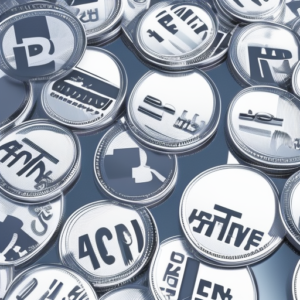The Future of Governance Tokens: How Cryptocurrency is Changing the Way We Govern
Introduction
Decentralized Autonomous Organizations (DAOs) are organizations that run on the blockchain. They operate without any human involvement and use smart contracts to execute business operations. This new model of governance is being adopted by many cryptocurrency projects, who are using DAOs as a way to incentivize community participation in their respective networks. In this article, we will explore how these Governance Tokens work and why they have become so popular with crypto projects:

Governance Tokens
What are Governance Tokens and How Do They Work?
Governance tokens are a new type of digital asset that can be used to govern organizations, cryptocurrencies and decentralized autonomous organizations (DAOs). They serve as the primary mechanism for making decisions on behalf of an organization.
The term “governance token” was first coined by Chris Burniske in his book “Cryptoassets: The Innovative Investor’s Guide To Bitcoin And Beyond.” He defines it as follows:
“Governance tokens are used to make decisions about how an organization operates.”
Exploring Different Types of Governance Tokens in the Cryptocurrency Market
Token Airdrops
One of the most common types of governance tokens is an airdrop. An airdrop is basically when a crypto project distributes free tokens to users in order to build up interest in their project and increase its value. This can be done through various methods, such as sending coins directly to users’ wallets or giving them away at events like conferences where there’s an audience ready to receive them.
Treasury Management
Another type of cryptocurrency-related token is one used for treasury management–the process by which money is spent on behalf of an organization (like a government). Treasury managers use these kinds of assets so they can make decisions about how much money should go toward certain expenses like salaries versus supplies or projects related directly back into business operations themselves instead just being spent on things like rent/rental fees associated with office spaces where employees work together every day.”
The Rise of DAOs and the Role of Governance Tokens in These Organizations
A DAO (decentralized autonomous organization) is an entity that operates under the control of its members via a smart contract. It’s often referred to as “self-governing” because it doesn’t need management or human intervention to run operations.
DAOs are formed by groups of people who want their collective decisions to be made transparently and efficiently by technology, rather than relying on traditional structures like corporations or governments. They’re also known as DACs (decentralized autonomous corporations).
Governance tokens are used within these organizations to ensure that everyone has an equal say in how the DAO functions, whether through voting rights or other methods such as reputation scores based on previous contributions made by each member toward achieving the goals set out at launch time when creating the organization in question–something we’ll talk more about later on in this article!
Challenges for Crypto-Asset Governance Tokens
Challenges for Crypto-Asset Governance Tokens
There are several challenges that must be overcome in order for crypto-asset governance tokens to become mainstream, including transparency and accountability, user experience, governance token security and stability, compliance with various laws (including securities laws), regulation of the market by governing bodies such as the SEC or CFTC (Commodities Futures Trading Commission), liquidity issues caused by illiquidity on exchanges and more.
Decentralized Autonomous Organizations and How They Can Solve These Challenges
Cryptocurrency is changing the way we govern. It’s not just about how money is spent, but how societies are organized and governed.
The first step toward understanding this new paradigm is to understand what a DAO (or decentralized autonomous organization) is. A DAO is an autonomous, self-governing organization that does not rely on any single entity for control or direction–it operates by consensus among its members and relies on smart contracts as its operational code. In other words: no one person controls it; it operates according to rules encoded into its blockchain; it cannot be shut down or censored; and anyone can see what’s happening inside at any time because everything from finances to decisions are transparently recorded on public ledgers.
Blockchain is changing the way we govern.
Blockchain technology is changing the way we govern. A blockchain is a distributed ledger that uses cryptography to keep records secure, and it can be used to store information on any subject. It’s like a database that anyone can access but no one can change without permission from the network.
Governance tokens are the next step in this process, allowing people to come together as a group and create their own money or currency for use within that community. Governance tokens are also referred to as crypto-collectibles or NFTs (non-fungible tokens).
The Future of Governance Token Cryptocurrency & The Benefits it Brings to Organizations & Businesses
The future of governance tokens is a bright one. Cryptocurrency is changing the way we govern, do business and live our lives. While cryptocurrencies like Bitcoin have been around for some time now, it’s only recently that people have begun to realize how much potential they hold for organizations and businesses.
In this article we’ll look at some of the benefits cryptocurrency can bring to organizations and businesses alike – as well as how this will change how we govern ourselves in years to come!
Conclusion
The future of governance token cryptocurrency is bright, and it has the potential to change the way we govern. We hope you enjoyed this article on how cryptocurrency is changing the way we govern and its benefits.
Disclaimer : I am not a registered advisor for this. this is purely my view on this and it is for informational purpose only…
![]()